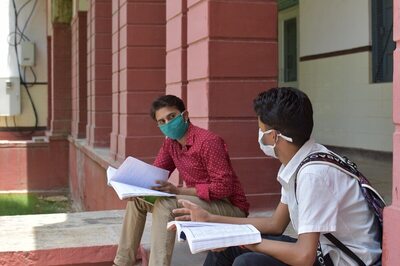
views
Mahatma Gandhi's principles have always served as a moral compass for India during and post Independence. Many prominent political leaders, as well as public personalities, have been guided by them, and every Indian has been taught his lessons on ahimsa (non-violence) and Satya (truth) in schools. But, while the rest of the nation learned from his speeches, books, letters and rallies, Gandhi's grandniece, Manu Gandhi, was one of those few fortunate ones, who learned from the man himself, till the last day he was alive.
Gandhi took a keen interest in Manu's learnings and although she never got a formal education, she learned English, geography and Hindu scriptures, under Gandhi's tutelage. Daughter of Gandhi's nephew Jaishuklal Amritlal Gandhi, Manu as a fourteen-year-old went to jail with Gandhi and stayed there for almost a year, for opposing the British rule. Since there was little to do in prison, except the monotonous chores, Manu began chronicling her days in a diary, a habit she kept on with till the day Mahatma Gandhi was assassinated on 30 January 1948.
These diaries, written in Gujarati, provides a revealing, and intimate portrait of Gandhi, and gives an unflinchingly honest account of the private life of Mahatma Gandhi, as viewed by Manu, who was not only one of the members of his inner circles but also his crutch (literally) in his older days. Manu, in fact, was the one holding Mahatma Gandhi, when he was knocked down by Nathuram Godse's bullet. Manu was also a part of the controversial experiment that Gandhi undertook in his old age, because of which his reputation carried irreparable damage; he invited Manu in bed, to test his own capabilities to conquer lust and remain celibate.
Manu's diaries have recently been edited and translated into English by Gandhian scholar, Tridip Suhrud, and the first volume has been published by Oxford University Press under the title, The Diary of Manu Gandhi. The book deals with Mahatma and Manu's days in prison, the national movement against the British Raj but more importantly with Gandhi's personal life, and the close emotional bond that Manu shared with him and his family. It also shows Gandhi as a practitioner of all that he preached to the nation.
One diary entry of Manu reveals how Gandhi took it upon himself to wash a soiled petticoat himself. It shows Gandhi's dedication towards cleanliness and hygiene, and how he was never afraid to get his own hands dirty in order to ensure cleanliness.
Bapu gives great attention to cleanliness. If there were to be any dirt, he prefers to clean it himself rather than point it out to someone else. An object had to be returned to its designated place; till it was done Bapu would be uneasy. Even if he were lying down, he would get up, and return the thing to its place. In the last phase Motiba was rather unwell. Every five to ten minutes she would need to defecate. Sometimes even her clothes were soiled. I (Manu) would wash her clothes each time they were soiled. One day I had stayed awake all night. Sushilabehn insisted that I should sleep. She said that if I did not sleep, I would not be allowed to do my ‘duty’. I went to sleep.
Someone placed Ba’s soiled petticoat in her bathroom. And that day, as fate would have it, Bapu went inside Motiba’s bathroom to wash his face, as Sushilabehn was bathing in his ‘bathroom’.
Bapu saw the soiled petticoat and began to wash it. Just then, I woke up and went to the bathroom to wash my face. I saw Bapu washing soiled clothes. I told Bapu, ‘Bapuji are we all not here? I went to sleep against my wish. Why do you harass us so? Will this not cause us pain? We are so many of us, won’t we have washed them?’ Bapu replied, ‘You were asleep. You need proper sleep. If you do not sleep, how are you going to be of service? It is not your fault in the least, but it appears that Ba’s petticoat has been laying here for quite some time because faeces has spread and hardened. I do not believe that so far no one has noticed it and that I am the first to see it. Sushila has been at her bath for some time now. Hence, neither you nor her are to be blamed. But, I believe that others have seen it. It is possible that my belief is wrong. But why has it not been cleaned? Not because people are averse to it, but because they have been careless. I asked around as to who had placed the petticoat in there. Th ere was a female attendant who had done so. I asked the others if they had not seen the soiled clothes. Everyone admitted to having seen it but said that they did not realize that they were Ba’s clothes.’ Bapu said, ‘It is sufficient for me to know that we are careless.’
Manu revealed that Mahatma Gandhi liked order, and structure, and it peeved him greatly if things were out of place. But, he was never strict or cruel in teaching others his lessons, his teachings always came with a good dose of humour. In her diary, Manu writes,
One day after my studies, my books were strewn around. For some reason I had to go inside for some work of Ba. From one task to another I forgot to place the books at their designated place. The books were lying around in the middle room used by Mahadevkaka. Bapu was about to step out for his walk. I was with him. The pages of the ‘Reader’ fluttered in the wind. Bapu said nothing to me, but he stepped inside. We wondered as to what had happened. I was ashamed; I took the books from him and placed them at their place. Bapu laughed, gave me an affectionate pat on the back and pulled my ear. He teaches us so much with good humour! And he also teaches us not to repeat the mistake. This is an art that he has.
Gandhi not only educated Manu about Geography, and English but also taught her many life lessons. One such lesson was to take care of her own body, and not follow any of the dieting fads. One of Manu's diary entry reads as follows:
I take two to five minutes to eat my meals. Ba complained to Bapu that since I eat so hurriedly I do not put on weight. Bapu said that from the next day I should take my meals with him. Ba said that I was so shy that I would not be able to eat anything in his presence. She further said that sometimes I took stir fried vegetables from her portion as we sat eating on the table and that I would not do so in his presence. She told Bapu to advise me against eating hurriedly. Bapu asked me, ‘Manu are you shy in my presence?’ I replied, ‘Bapu who can be shy in your presence? That is Ba’s way of saying things.’
Bapu said, ‘I do not like that you eat in a hurry.’
I said, ‘Bapu, however much I try I end up eating fast.’
Bapu said, ‘These days it has become our way in the country not to care for our bodies. It seems to have become a fashion to be a weakling and brittle bodied, isn’t it?’ I replied, ‘Bapuji I know nothing about the fashion as for the past one year I have been with you. Don’t you know whether I am simple or fashionable?’ Bapu said, ‘You are simple in every way, save in eating where you indulge in fashion.’ I said, ‘But Bapuji, my weight had gone up to 16, but this time I lost two pounds and I am berated by everyone, they tease me.’ Bapu said, ‘We wish to train you thus, unless we tease you, you will not learn to care for your body.’ I told Bapu, ‘But I have this habit of eating hastily for quite some time now.’ Bapu replied, ‘It pains me that no one cared to explain this to you.’ There were many such small and subtle events and Ba and Bapu’s care for me would come forth.
One day, I did not spin at all. I had resolved that the day I do not spin, I should forsake one meal as well. It was time for the evening meal. Sushilabehn and Motiba called me to eat. I told Motiba that I did not wish to eat as I had not spun that day. Ba said, ‘You do not like to spin, and not eating is something that you like very much. So, you would neither spin nor eat!’ I got up having decided to break my resolution. But before doing so, I asked Bapu’s opinion. Bapuji said, ‘Can resolutions be broken so easily? If we break resolutions, however small, how shall we keep large resolutions? You are correct in keeping the resolve on but there should be a fixed time for spinning. It cannot be that you spin in the morning on one day and in the evening on the other. But Ba would be pained if you do not eat. You should break your resolutions for her sake.’ I broke my resolution.
The Diary of Manu Gandhi, edited and translated by Tridip Suhrud, has been published by Oxford University Press, India. The book costs Rs 750.


















Comments
0 comment